Throw our future into the ocean
Cast out anger
Cast out fear
Let the gods of the deep purest love appear
Creating a fervent following since its debut release, Kiss + Swallow in 2004, Chris Corner’s musical project IAMX has been a tour de force in the realm of DIY artistry with ten studio albums, scores of music videos, and remix releases. Deftly avoiding easy classification, IAMX spans genres and explores both the individual and collective challenges and spectacles of humanity, often probing his own experiences to curate deeply personal lyrics and musical compositions.
With an extensive tour schedule of 27 dates over six weeks, Corner will be joined by longtime IAMX live members Janine Gezang and Jon Siren (Psyclon Nine, Skold, Front Line Assembly) as well as Sarah Pray (Carrellee). Corner and Gezang have also collaborated on HEADNOISE since 2019, a project that creates gatherings fostering dialogue around a range of topics relating to mental health and held both online as well as in-person at Corner’s Southern California home, and before IAMX performances, with all gatherings recorded and available online. From the dynamic live shows to HEADNOISE and the level of connection Corner maintains with the IAMX community, it is easy to see how IAMX has enjoyed such a dedicated following and the longevity of over 20 years producing music.
Chris Corner spoke with Post-Punk.com ahead of his upcoming Fault Lines² North American Tour about the firsts of this tour, the unique issues emerging for artists with the rise of AI, the role of vulnerability and obsession in creativity, and what Corner would add to an IAMX mixtape.
For the upcoming tour, I was surprised to see that this will be your first time performing as IAMX in New Orleans at Santos Bar.
I don’t know if it’s the money thing, the scene thing, it could just be a practicality thing, or it could just be bad luck that it never really happened—even with Sneakers, the previous band, it never fell into place. Everybody would talk about it and say how incredible it was. It could be the niche that I’m in is a little bit less covered in that area. I don’t really know much about it but everybody seems very excited about it and I’m starting to get excited about it, too, now.
I think New Orleans has an appreciation for all types of music. Its the kind of place where people can wander the streets and pop into a bar to sit down and listen to whoever it is that happens to be playing. It’s easy to become totally engrossed in the moment in a place like that.
That’s very exciting. I’ve heard a lot about that free, open-minded attitude and all types of freaks and I like that. I’ve had that in a few different places and I do love that about cities that have that intense freedom feeling. Berlin is like that. So to have it in the States is going to be interesting.
I wonder if you’re going to feel similarly to the way you did about Berlin when you get to that show in New Orleans, that similar sense of beauty in the decay with the past seeping into the present and topped with people’s hopes for the future.
I can sense that and it’s very attractive to me. When I enter cities or places like that I do want to plant myself and be part of the evolution because you feel like you can be part of it in a place like that, or you can get involved in growth in a natural way as opposed to just pumping the place full of money. I can see how Berlin is a little bit more gentrified these days but it’s not over, it’s still a beautiful city. There’s definitely a lot of freaks out here [in Southern California] in the sense of true freaks and I don’t know, I find it magnetic. I grew up totally working class, zero money and hope and all that kind of stuff and yet there was also a real beauty to the attitude, so whenever I am around that, it’s very grounding. I know it’s weird because there’s also some weird criminal shit going on and yet I’m still attracted to it. I don’t know why that is, but it’s still there.
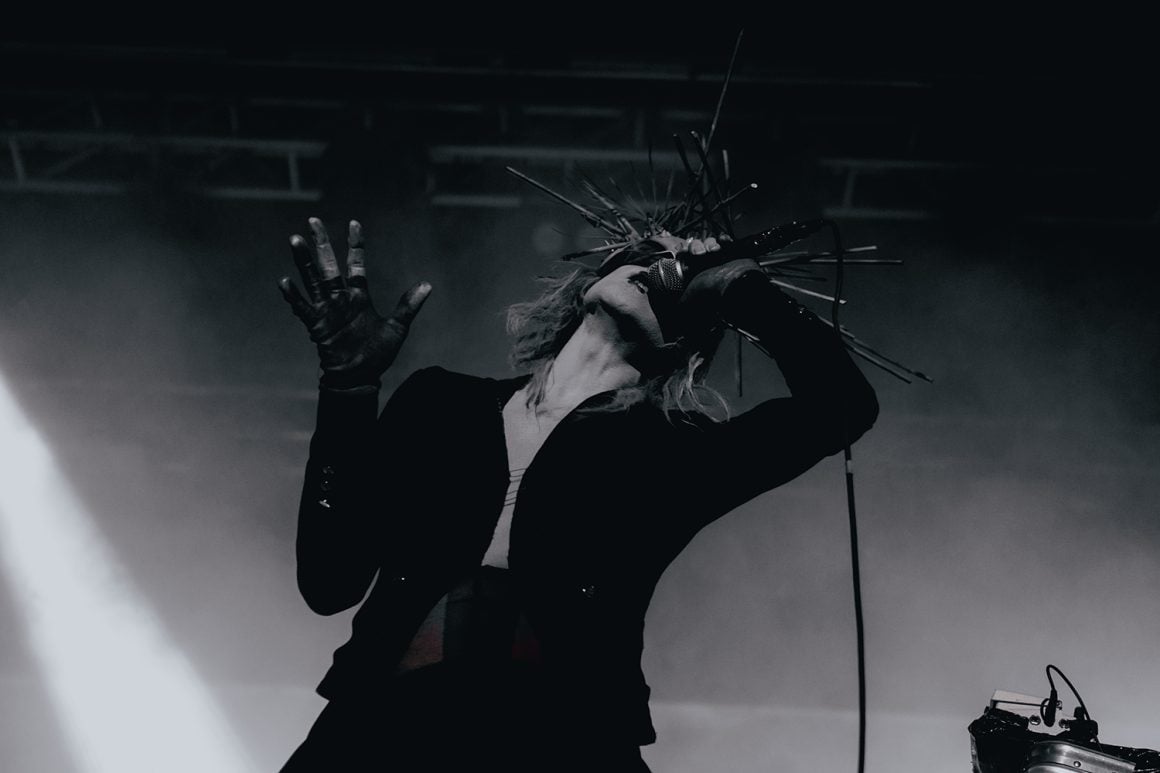
Your desert oasis Silent Valley Studios is one part studio, one part gathering point for the IAMX community. How has it evolved since you first relocated to this space and what has it taught you about community as well as your relationship with your work?
It’s a quiet time right now, so in a way it’s come full circle. It’s come back to being quite solitary here. I started with a lot of big plans and actually put a lot of it into motion and a lot of life stuff said ‘no’ to it. I’m still hopeful to make a lot of it happen but I’ve had to rethink my time scale. I’ve learned a big lesson. I tried to jump into it, you know, it was post-Covid, everybody’s going fucking wild and minds were all over the place, as was mine. It’s beautiful right now, it’s very calm and I feel stable and good and ready to really lean into what I was trying to do. I think I got it wrong and I think I now know why.
You’re describing a vulnerable part of the creative process when you try and stumble.
It is, on a life scale. It’s like, rather than just one song or one piece of art, it’s a whole phase of my life that even though I had the best of intentions and felt like I was doing it skillfully, I didn’t navigate that very well.
It sounds like you’re going into a new chapter with this space.
There’s so many moving parts we’d need to talk a whole day about it. But in terms of just skimming the surface, there’s a real unmasking that I’m doing now in many aspects of my life: autism, relationships, polyamory, things like that are just coming to the surface that have been touched upon but not fully explored. It’s a very exciting time for me but I’m not there yet. So you’re catching me at an interesting moment, a transitional moment.
It seems like there are so many crosswinds blowing, it’s difficult to know what’s worth investing our energy and time into, because you don’t want to invest in something that won’t grow. I think this is connected to the digital revolution we are living through right now. Bringing people together, even if it’s only through a digital platform like Zoom, is a great use of energy, and I see your project HEADNOISE doing this.
Absolutely. We are resonating here. This is exactly what I’m feeling plus life events that have fast-tracked that. I feel the cultural shift, too, and it’s probably subconsciously AI poking at our deepest human fears that we’re all going to become redundant.
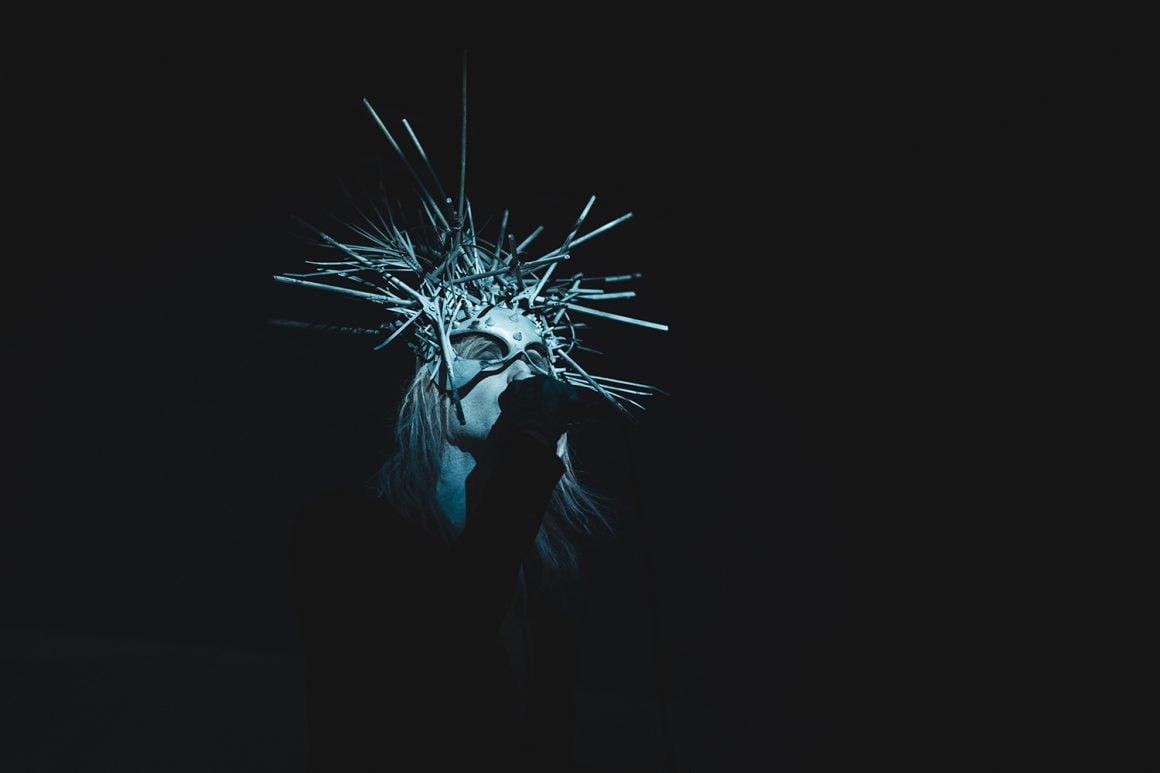
As a performer, how have you seen culture change since the rave scene of the 90s when you were in Sneaker Pimps, and do you now see a blurring of genre lines or more edges around them? In other words, do you think we’re in a place where music genres have become more crystallized or genres have instead become blurred or hybridized?
It’s so difficult to pin down all of those things that you’re talking about. I flip-flop between everybody just wants authenticity and at least we’re still flesh. You know, at least we can still go into a room and be tribal with each other. Is that all we have left? I don’t know, because you also described the benefits of communicating digitally and there is that. Some lonely people may want to connect and can connect on a totally different philosophical level than has ever been possible. So there are so many different facets to it. I think it would be naïve to say we’re all going to be chopped and AI is going to provide everything because there’s so many different parts of culture and society that do want different things or will tolerate different things. I think if you take my audience, they probably wouldn’t tolerate inauthentic things but then there’s also the convenience of certain things. As an artist, do I spend a month slogging away at making a great video or great piece of visual art for it to not be seen or for it to be seen as AI or to be second-guessed or questioned or for it to just be a part of a reel that no one really cares about because the attention span is so tiny? What is that? I think we have to look at culture rather than just the artistic process and that’s the difficult part. If we can’t second-guess anything, all we can do is lean into what we feel has meaning. I feel like it changes so often, I know we all still feel like we want music, we all want physically to dance. We want to connect. The next generation may see that in a different way but it’s still biology, right? It’s still physical, at least for now. That might change as the brain gets rewarded in different ways. It’s mind blowing but I can’t deny that there’s a certain excitement to the idea. For instance, I would be lying if I said it’s not exciting that I could possibly not have to go to a photo shoot, spend loads of money on it, and somebody could take my likeness and do it. It sounds gross, but there is a little part of me that thinks that might just make my life easier, actually, and I could get on with the stuff that I think is more meaningful. I don’t know, I still feel there is room for true, authentic human art expression, maybe in conjunction with AI or maybe not. Maybe people start to be able to discern and there’s just two genres, AI and human.
So the record store is going to be the AI section and the human section? No more rock and pop, no more world, no more jazz.
Possibly, and with AI you can get so specific. It could be genre-less or it could make a new genre. It could also be boundless in terms of how it could express itself.
You strike me as someone who’s never attached yourself as IAMX to a single genre; you’re in the liminal space of genres. Do you agree with that sentiment or do you see it differently?
I do. There’s a certain part of me that’s quite contentious. It annoys me that one can be so frivolous with one’s perception of something. So yes, they may hear something and go, oh, that sounds a bit like darkwave or goth, or it sounds a bit rock or electronic. Fair enough, that’s fine if you’re moving through it in passing, but it always felt annoying because humans are so multi-dimensional. If I think of a person in a band that we all know like The Cure, I just think of their lives, I think of the whole package, what their philosophies are or what did they like to eat? Yes, there’s the music, but it’s just part of their expression. I’m more interested in the human and that’s where the genre thing always annoyed me because if I like something, I want to know more about the human creating it and not where it fits in a nice package. So I guess maybe I’ve subconsciously been aware of that and try to avoid certain genres, but I haven’t been fully aware that I’ve been doing that. I just react to what I think is valuable at the time and what I can achieve as well. It’s not like I feel like I can do everything, I just do what I can do. I can do me and me is this thing which is multidimensional. Maybe it sounds a bit like this or that or whatever, but that’s all I can do. Being in the music industry and coming out the other side and finding IAMX is the point where I feel like I went through the grinder and then found something that was meaningful to me. Since that point, I made it the minimum how I would engage with the industry because I just felt like its agenda was never really aligned with my own.
“Obsession,” from the Latin “obsessus” signifying the act or state of being besieged, is a word I associate with you as an artist and as someone who is well read and enjoys learning about technology and exploring the human mind. Do you think this is a central theme for any artist and does that word resonate with you?
It’s a fantastic question. I think it’s almost so second nature. I can’t perceive it from a distance. I don’t know if I would see myself like that, but that might be the problem because it feels like I’m never doing enough. Not that I haven’t achieved anything but it’s more like I need to push further, I need to do more and the little voice says, “Just do it. You need to complete it and you need to live with it.” So there is an inner voice that, depending on which subject I’m focusing in on, is a bit obsessive and I feel like it’s a positive thing for me. These days I don’t feel consumed or anxious about it anymore. That’s actually a positive driving force that gets me to finish something and for it to be valuable and something I can stand behind. From the outside it may look obsessive. It doesn’t feel so much so. Also, partly because I think I have a terrible working memory, there are certain things I don’t remember so when I zone in on something I do feel like I have to obsess enough to just remember what I’m doing. You talked about technology and unless it’s a special interest, which is connected with my autism in which special interests are natural, I don’t even have to think about it but I do have to be a bit obsessive if I throw myself into something. Otherwise, I guess it could be a standard that I’ve set for myself that if I don’t do that I will regret it and I don’t like that feeling, so I’d rather suffer a little bit of obsession than regret.
What do you love about the process of making music videos—visualizers, as you call them—and do you find that a style has emerged in your filmmaking?
Again, that’s a very penetrating question. I think it gives a broader value to expression for me, for this project at least. It allows me to give a broader understanding of me to others and hopefully to be accepted and loved and seen through the lens of a visual as opposed to music. I feel like music is beautiful but it can be quite limiting and once I get to that limit, I feel like I can’t say much more with that. I mean, I could do a remix or I could rewrite that thing or I could get a different singer—I could do lots of things, but that’s it. How do I expand on that? And that’s where the visual comes in. That combination of music and video I’ve always just felt is so powerful, it seems to elevate the emotion more for me when I see my own music connected with a visual. It doesn’t even have to be something I’ve made, it just transcends me as an individual. It becomes something that’s out of my control and something ineffable that is beyond me. I like putting those things into motion when you hit something and you don’t know how you did it and you don’t really care that [it was] you that did it, you can enjoy it and see this transcendent thing that’s happening.
Do you recall an experience that felt like a transcendent moment of the visual and the audio coming together?
Yeah, there are a few moments. There is a video that I did for one of the instrumental tracks that is in my instrumental phase, it’s called “Art Bleeds Money” and it was just a very cheap handheld little shitty camera and the product just transcended all of the parts. So just from a DIY perspective, it was great and very fulfilling in how it came out and the little tricks that I did. Again, I feel like I’m just the vessel a lot of the time, I’m not really in control, but when it comes together and you see it and it’s beyond what you imagined, that video did that for me. I think it’s not my best musical work but it was a moment that I felt very locked in.
Can you divulge any of the art direction in store for the upcoming tour? IAMX performances are notable for the thoughtfulness behind what you’re wearing, the lighting, and how everyone is presented on stage—it feels alchemical in a way because of how you change the energy in that space for the audience.
About a month before the tour, I usually start in the barn piecing things together. A lot of it comes from practicality because with indie tours you can have incredible ideas but a lot of it just cannot translate.
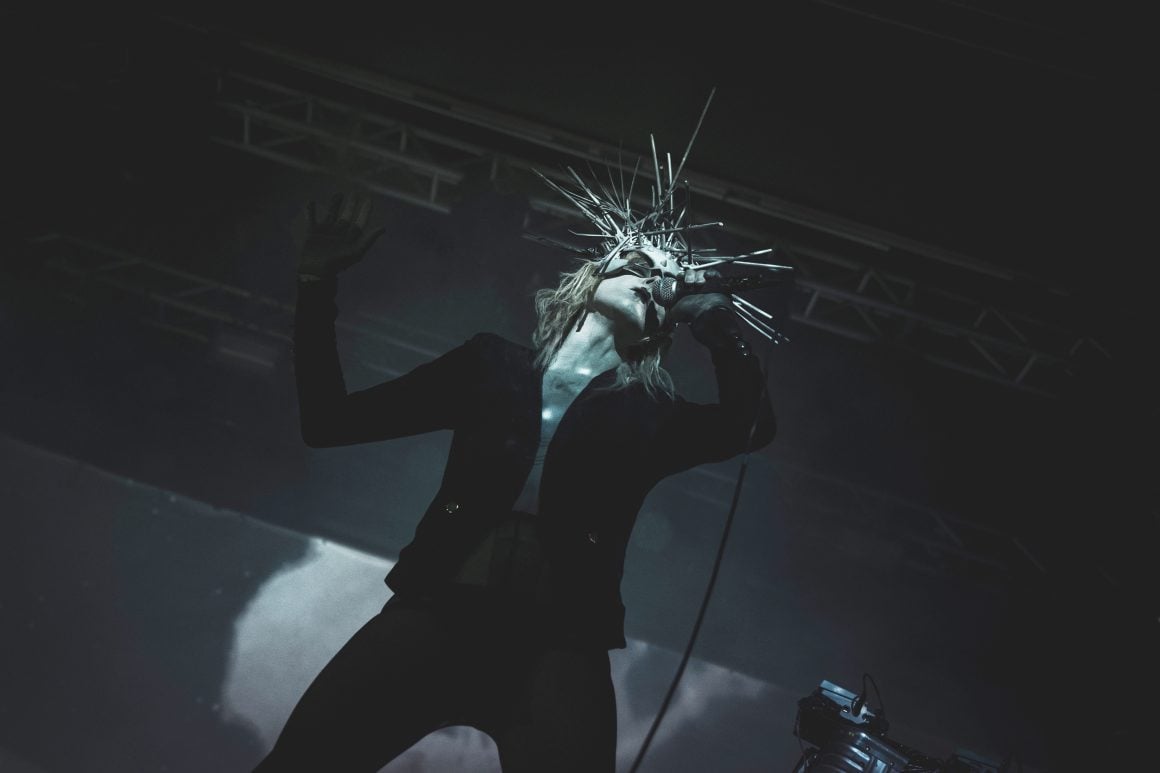
So Jon Siren won’t be playing drums upside down over the audience like Tommy Lee?
Exactly! Give me a million bucks and I will make the most perfect show. I learned a long time ago, I accepted my fate as an indie artist and there’s something quite lovely about the challenge of having to work with minimal means every time. How do you make it interesting and better? Mostly for myself, so I feel like I can go out there and actually project enjoyment as well as everything else. I probably speak for most artists on every level because touring is a grind. I mean, it’s also kind of beautiful. You go to connect and if I didn’t have that really sort of sweet, deep connection with those people in those intimate spaces I don’t think I would be able to last very long doing this. I feel like I’m part of the experience with them and that’s very rewarding. I love that part of it but with the practicalities it’s hard. I’m at a point in my life where I’m adding meaning, so I need this to feel it was meaningful and it was valuable not just to them, but to me, so that we can keep this thing going. I do work on that a lot in the month before and the more interesting I can make the show, the more successful I feel like the tour will become.
Your approach to touring during the pandemic with all of the health and safety restrictions was met with innovation: performing at outside venues and using Silent Disco headphones for attendees. Those were great because they allowed you to hear the music properly and the way it was intended to be heard. Are you incorporating any of this into your upcoming tour?
I did love that part of it but some people didn’t like it. I think they just felt like they would be disconnected from the energy in the room. But I loved it.
Performing in outdoor spaces was part of your response to what we were dealing with during the pandemic. Of course, performing outdoors means you’re dealing with a lot of other issues with sound. So headphones were one way to solve that.
That’s exactly why I brought it in, I really wanted to be able to go out, not make much sound and be able to play in a parking lot, which we did a couple of times on that Covid tour. We first started doing it just as an open rehearsal where people came in the event space here and it worked well. So then we thought, well, fuck it, we’ll just take it on tour. I’d like to do it again, for sure. It’s quite impractical and it’s a lot of headphones—you have to clean them every night, too.
You previously stated in an interview for Reflections of Darkness that “We can all be creative to some extent, we can all claim to be artists and writers and musicians, yet the commitment to progress to move forward to authentically help and affect others, to change their viewpoints to open people up to guide them, to improve yourself, to make people feel less alone, to ask big questions and to probe what others don’t. These are the duties the artist has. Otherwise, it is a glorified hobby. You must expose yourself, fail, succeed, fail again, be humiliated, be ashamed, be ecstatic, be adored, hate yourself, love yourself, be respected, be inspected. Art is psychological risk-taking.” Do you still agree with this statement and is there anything you would add to this? It sounds like what you were saying earlier about your space and all the changes that you’re going through right now.
I do. It was definitely a good thing for me to find my duty in life. There’s so many questions as an artist, you’re constantly questioning the world, yourself, everything. That can be very productive, very good, but it can also be incredibly self-destructive. To place it in the realm of something that’s bigger than yourself is comforting. I’d say that I’ve probably leaned more and more into that. It’s not purely altruistic, of course; all artists are selfish to some degree or self-obsessed to some degree. They have to be, but there’s definitely the feeling of wanting something in the world and the realities of the exposure of that is good to know. I think you have to own it as an artist, at least I do. The more I own that shit and it becomes second nature the less I suffer in it because you can suffer a lot by thinking, “Oh, that’s shit, what did I do?” or “Oh God, I have to go on stage tonight, you’re going to die from adrenaline,” or whatever. You drink less because you know that’s what you have to do or you question your well-being less. I think it could just be age, wisdom, I don’t know, but definitely at some point you have to make peace with what the life of making art is and there is a difference between true art and hobby. I think there is.
In your lifetime so far, you’ve let fans in to see those ups and downs. You’ve been vulnerable publicly and it seems like there was quite an outpouring of support and compassion in response to that. Hopefully, that support fueled your return to creating, which is right back to the creative process of try, fail, reform, try again.
Absolutely. And you have to get used to that rhythm so that when you are down you don’t question the whole thing. When I had a major breakdown years ago I started to try and identify the triggers and the stressors of what put me in this place and I really did identify music as one of those things at that time. I found it difficult to get back into because I thought that was doing the damage or at least some of the damage. I don’t think that now, but then I was very doubtful that I could continue because I thought it was too exposing, too intimate, too self-obsessive, you know, constantly writing about myself, constantly being on the slab, going out, being inspected or other things I described in that quote, really. Coming out through the other end of that and getting back into the rhythm, seeing how much it gave me and how nourishing the process is and how safe it is for me, it reversed. I’m sitting in my white trash trailer, which is a studio that I built for myself that I can drag around anywhere on the property and I love it. I mean, in here I feel safe and I feel like I can access my core at any point through that or through this, and through this interview.
If you were to curate an ‘IAMX starter’ mixtape what songs would you include to introduce your artistry?
Because it’s such a squirrelly project, I feel like it depends on what you’re looking for in it. You know, you can get a bit of sex, a bit of drugs, a bit of emotion—what do you want today?
What if the listener wants to meet you, the artist? There’s a lot of ground to cover. If they were to listen to the latest album, Fault Lines², and then go backward through your catalogue, they will be listening for a long time.
This is true. It could just be a weird AI medley of the ‘best of’ stuff in one song, in one reel. It stimulates me into thinking about the retrospective, the history, the whole thing. What is it? What the fuck am I doing? You know, what am I saying? But it’s so moment-specific I don’t feel like I can easily wrap it up. But if I have to, I’d probably take the album tracks, stuff where you have to dig a little deeper and I think that’s where you’ll find the heart of it all. You can choose a track from each album and definitely choose the ones that haven’t been released as a single and that’s where my true nature is. You pick a song like “Look Outside” from Metanoia (2015) that’s very meaningful to me. It’s very short, but it means a lot. You could take something from The Alternative (2006), “Lulled by Numbers” or something, where the pace is slow, it’s kind of heavy but hopeful. There’s so much in the album tracks and that’s where I’d point to. There’s a track called “War of Words” from Fault Lines² (2024) which I just did an orchestral version of, I re-sung the whole thing. It’s going to be released on the rework package coming out just before the tour. That’s a nice version of a track that I felt a little bit like I should have done that on the album but it didn’t feel as coherent with the rest of the sound so it’s just a little excursion. But again, that probably demonstrates more about me as an artist, restless and I have to keep tweaking and I enjoy those more oblique tracks.
I think about that line from “The Ocean (feat. Hafdís Huld)” where you sing “We cannot fight the tide.” That song feels like a battle hymn right now for anyone who’s paying attention to what’s going on—and it’s quite a lot going on for those of us who are sensitive to the fragility of the situations we find ourselves in. You really went somewhere quite deep with that song and I have the sense that you sat with that material for a long time before it came to light and before you approached a microphone to deliver those words.
It did take a long time and that thing’s been floating around for probably ten years. But it never was finished and it never had the depth and the meaning that I wanted to put into it. Not to get too dark, but Janine, who is part of IAMX, her parents died last year in a car crash and it was very sudden and unexpected, of course. I knew them very well and it was just wild. I’d already finished the track, but it was certain tweaks that I needed to do to it when that happened. I went back to it and added a few things and it became a kind of anthem for them and it was played at their funeral on the request of Janine and it just sort of transcended how I’d imagined the song and it sort of took on a life of its own. So it’s interesting that you pick up on that because it is a very meaningful track.
There’s a lot of pain in that song and there’s grief. The experience of aching to find some meaning in the grief, I’ve heard wise advice to “take those feelings to the water,” as a way of saying we don’t have to bear it alone. What you’re saying reminds me that if you’ve been touched by loss or trauma and if it’s ripped open a part of you, it has changed you. If it took ten years, Chris, it’s because you now were ready to do the song. The song was ready, but you were not ready to be the one bringing it into the world yet.
That’s so true. It may be an artist thing, but I find myself behind myself. I find I’m always trying to play catch up, which is a very strange thing, because you’re kind of writing your future and later you see “I was saying that” and that’s who I really was at that time. Very cathartic, of course, but peculiar.
I think ‘peculiar’ is a good word to end this interview on, don’t you think?
I think it is, yes. §
IAMX will launch the Fault Lines² North American Tour on October 10th, 2025, in San Francisco at The Chapel, kicking off a six–week trek across the continent. From California, the itinerary winds north to Sacramento before cutting inland through Salt Lake City and Denver, then eastward to Kansas City, Chicago, Toronto, and Montreal. The tour continues down the Eastern Seaboard with stops in Philadelphia, Baltimore, New York City, and Richmond, before heading south through Atlanta, Tampa, and New Orleans. From there, Corner and his bandmates turn west once again, with performances in Texas, New Mexico, and Arizona, before concluding the run back in California at The Teragram Ballroom in Los Angeles on November 21st and Brick By Brick in San Diego on November 22nd.
Tickets for all shows are available now via IAMX’s official website,
Tour Dates
- 10 Oct 2025 San Francisco, CA – The Chapel
- 11 Oct 2025 Sacramento, CA – Harlow’s
- 16 Oct 2025 Vancouver, BC – Rickshaw Theatre
- 17 Oct 2025 Seattle, WA – El Corazon
- 19 Oct 2025 Salt Lake City, UT – The Urban Lounge
- 21 Oct 2025 Denver, CO – Ophelia’s Electric Soapbox
- 22 Oct 2025 Kansas City, MO – recordBar
- 24 Oct 2025 Chicago, IL – Bottom Lounge
- 26 Oct 2025 Ferndale, MI – Magic Bag
- 28 Oct 2025 Toronto, ON – The Axis Club
- 29 Oct 2025 Montreal, QC – Théâtre Fairmount
- 31 Oct 2025 Philadelphia, PA – Dracula’s Ball at Underground Arts
- 01 Nov 2025 Baltimore, MD – Ottobar
- 02 Nov 2025 New York City, NY – Le Poisson Rouge
- 04 Nov 2025 Richmond, VA – The Broadberry
- 06 Nov 2025 Atlanta, GA – Purgatory at The Masquerade
- 07 Nov 2025 Tampa, FL – The Orpheum
- 09 Nov 2025 New Orleans, LA – Santos Bar
- 12 Nov 2025 San Antonio, TX – Sam’s Burger Joint
- 13 Nov 2025 Austin, TX – Elysium
- 15 Nov 2025 Houston, TX – Numbers
- 16 Nov 2025 Dallas, TX – Trees
- 18 Nov 2025 Albuquerque, NM – Launchpad
- 19 Nov 2025 Phoenix, AZ – The Rebel Lounge
- 21 Nov 2025 Los Angeles, CA – The Teragram Ballroom
- 22 Nov 2025 San Diego, CA – Brick By Brick
Follow IAMX:

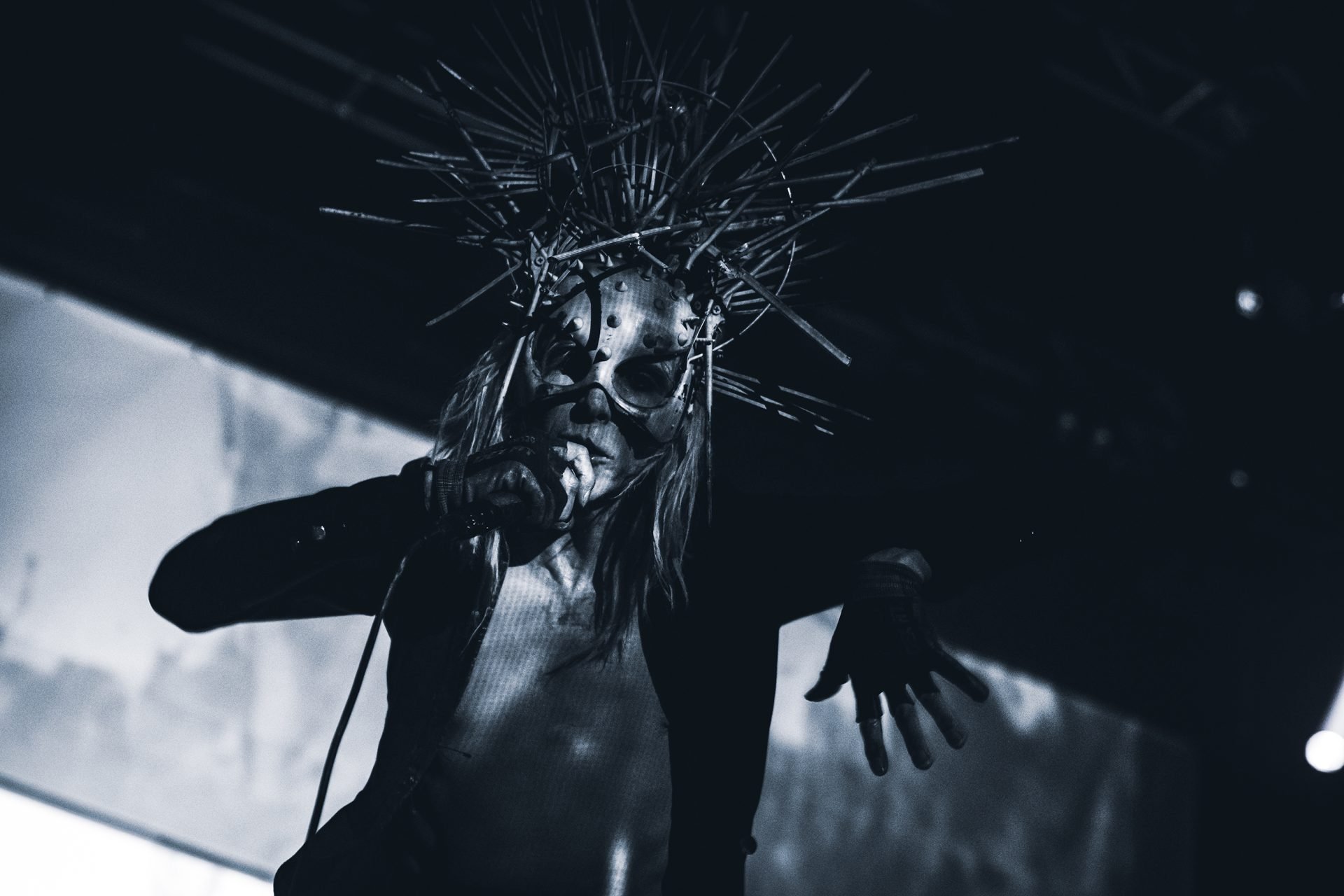



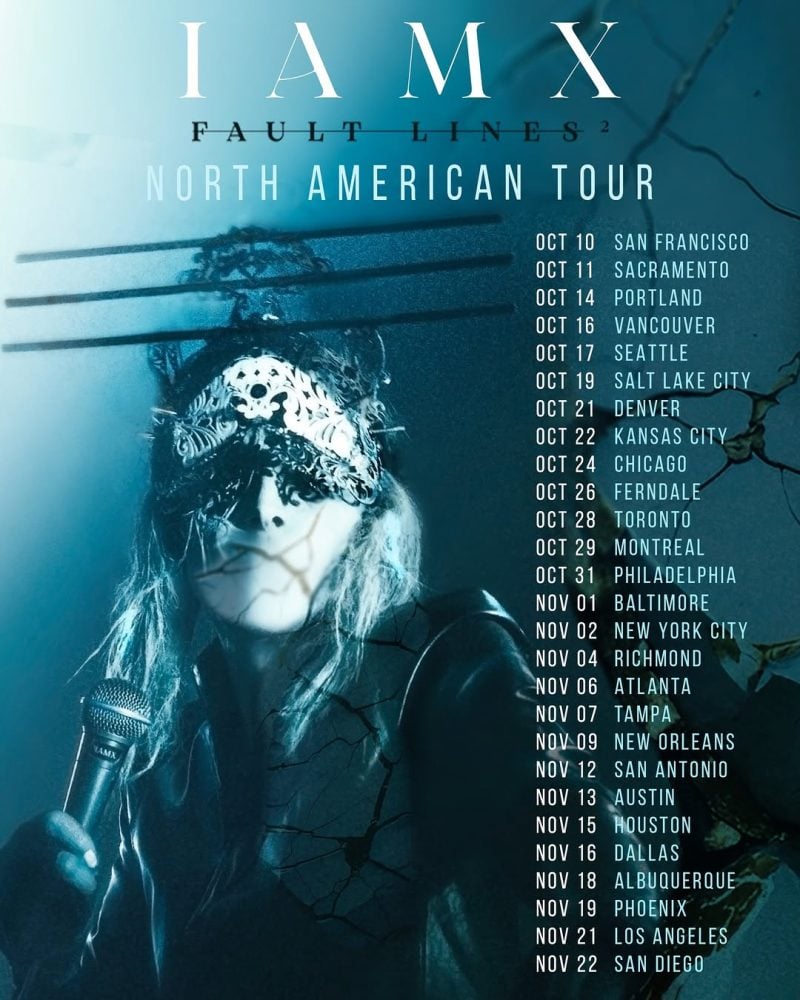
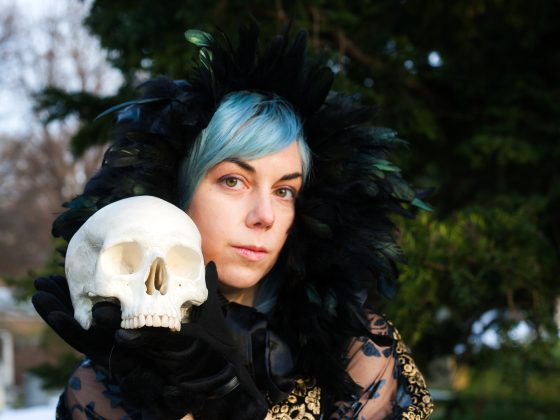
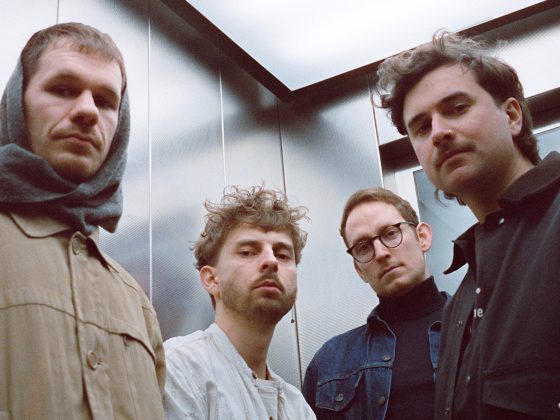

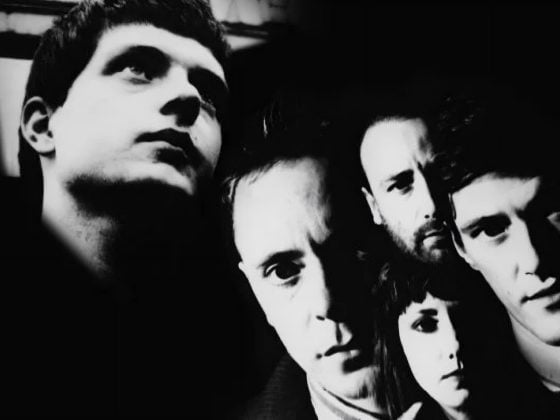


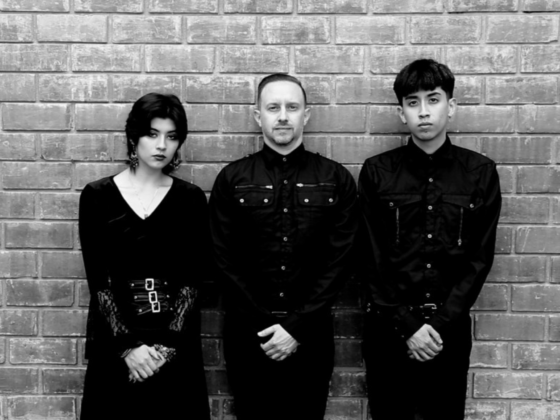
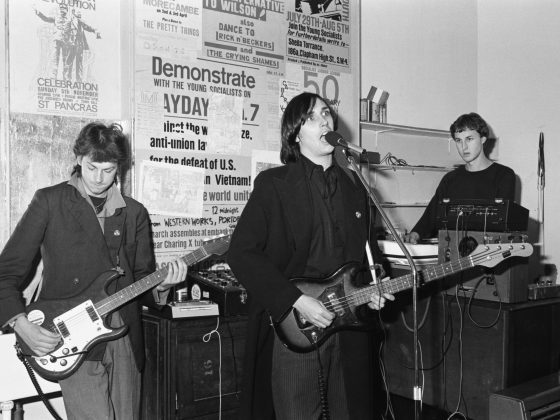




 Or via:
Or via: